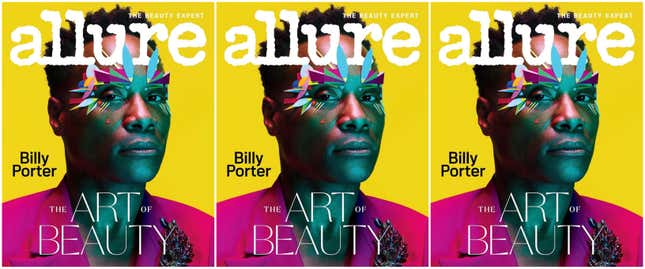
“I’m part of the first generation of gay men, ever, who get to be out, loud, and proud in the world. My generation is the first,” says Pose star, red carpet slayer, and multiple major award-winner Billy Porter. “Bitches are scared. And they should be.”
Porter, who in September became the first openly gay black man to win an Emmy for Lead Actor in a Drama Series is making history yet again, now as the first male cover star of Allure magazine—its first in 29 years and 345 issues, writes Editor-in-Chief Michelle Lee.
“I want to emphasize: Billy Porter is not on our cover because of his gender,” Lee explains. “Although he’s been a face for the growing number of famous men branching outside the red carpet’s typical tux-and-tie, he—like all of us can’t be defined by one facet...After all, having the freedom to express yourself is art we can all appreciate.”
Now as well known for his fashion statements as for his groundbreaking and highly nuanced work on stage and screen, Porter is enjoying his haute couture moment in the sun, as he should.
“I always wanted to express myself in my clothes differently. And I always had great taste. And expensive taste,” he tells Allure, recalling: “When I was 10, I could walk into a store for my Easter suit and scan the suits...and it would inevitably be the most expensive suit in the store.”
Now, Porter’s gender-neutral suits, dresses, and definition-defying ensembles are designed by the likes of Christian Siriano and Thom Browne—not to mention the lesser-known designers he’s brought along on his seemingly infinite red carpet ride.
But as Porter shares with Allure, this present moment—one in which he regularly and gleefully challenges heteronormative ideals—is a triumph, after a childhood in which he was told “You’re not masculine enough” and was sent to a psychologist at five years old to be “fixed.”
“I carried that with me for my whole life until, like, two and a half minutes ago. You know?” he admits.
Porter, now 50, also admits once believing proximity to whiteness was the only way out of a marginalized existence.
“I wanted to go to private school because that’s where the white people went, and white people were successful,” he now says. “That’s all I understood. I need to be with the white folks because they’re successful. I need to align myself with the white people and the black people who understand that.”
Do we understand now? Maybe not en masse, as Porter has been derided for somehow singlehandedly attacking and undermining black masculinity, to which he responds: “First of all if your masculinity is that weak, it should be attacked. Secondly, I didn’t know I had that much power. But now that I do, you can expect I’ll be wielding it every fucking chance I get. Every chance. It’s a calling, it’s a ministry, it’s intentional. I know exactly what I’m here for. And that is power.”
“I’m not hiding...I’m not doing that,” Porter says. “I’m going to be proud of what I fucking worked for. I’m here; I’m not hiding in anybody’s corner. Yes, it’s me; I’m not taking no pictures; God bless you.”



